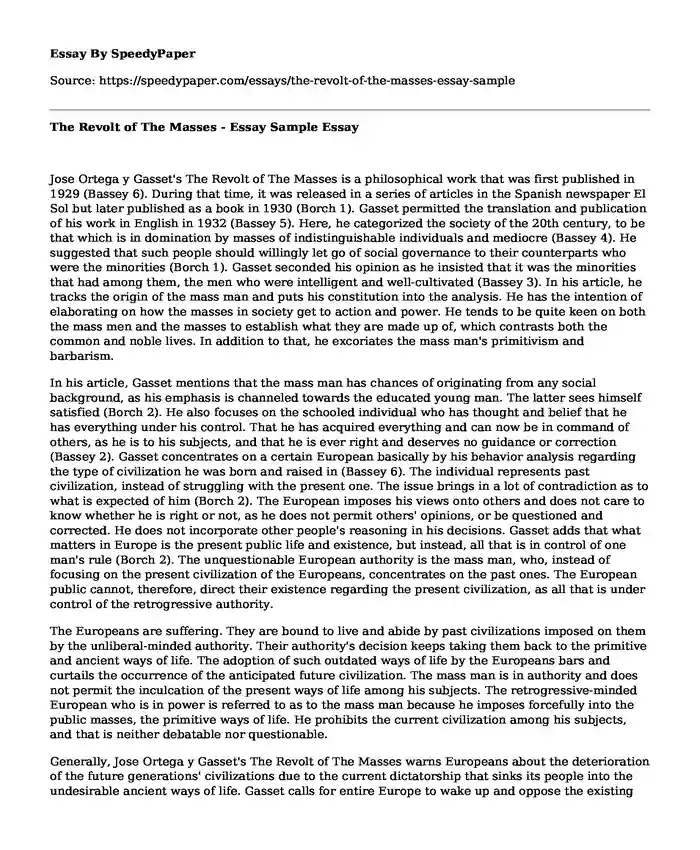
| Type of paper: | Essay |
| Categories: | Philosophy |
| Pages: | 3 |
| Wordcount: | 702 words |
Jose Ortega y Gasset's The Revolt of The Masses is a philosophical work that was first published in 1929 (Bassey 6). During that time, it was released in a series of articles in the Spanish newspaper El Sol but later published as a book in 1930 (Borch 1). Gasset permitted the translation and publication of his work in English in 1932 (Bassey 5). Here, he categorized the society of the 20th century, to be that which is in domination by masses of indistinguishable individuals and mediocre (Bassey 4). He suggested that such people should willingly let go of social governance to their counterparts who were the minorities (Borch 1). Gasset seconded his opinion as he insisted that it was the minorities that had among them, the men who were intelligent and well-cultivated (Bassey 3). In his article, he tracks the origin of the mass man and puts his constitution into the analysis. He has the intention of elaborating on how the masses in society get to action and power. He tends to be quite keen on both the mass men and the masses to establish what they are made up of, which contrasts both the common and noble lives. In addition to that, he excoriates the mass man's primitivism and barbarism.
In his article, Gasset mentions that the mass man has chances of originating from any social background, as his emphasis is channeled towards the educated young man. The latter sees himself satisfied (Borch 2). He also focuses on the schooled individual who has thought and belief that he has everything under his control. That he has acquired everything and can now be in command of others, as he is to his subjects, and that he is ever right and deserves no guidance or correction (Bassey 2). Gasset concentrates on a certain European basically by his behavior analysis regarding the type of civilization he was born and raised in (Bassey 6). The individual represents past civilization, instead of struggling with the present one. The issue brings in a lot of contradiction as to what is expected of him (Borch 2). The European imposes his views onto others and does not care to know whether he is right or not, as he does not permit others' opinions, or be questioned and corrected. He does not incorporate other people's reasoning in his decisions. Gasset adds that what matters in Europe is the present public life and existence, but instead, all that is in control of one man's rule (Borch 2). The unquestionable European authority is the mass man, who, instead of focusing on the present civilization of the Europeans, concentrates on the past ones. The European public cannot, therefore, direct their existence regarding the present civilization, as all that is under control of the retrogressive authority.
The Europeans are suffering. They are bound to live and abide by past civilizations imposed on them by the unliberal-minded authority. Their authority's decision keeps taking them back to the primitive and ancient ways of life. The adoption of such outdated ways of life by the Europeans bars and curtails the occurrence of the anticipated future civilization. The mass man is in authority and does not permit the inculcation of the present ways of life among his subjects. The retrogressive-minded European who is in power is referred to as to the mass man because he imposes forcefully into the public masses, the primitive ways of life. He prohibits the current civilization among his subjects, and that is neither debatable nor questionable.
Generally, Jose Ortega y Gasset's The Revolt of The Masses warns Europeans about the deterioration of the future generations' civilizations due to the current dictatorship that sinks its people into the undesirable ancient ways of life. Gasset calls for entire Europe to wake up and oppose the existing leadership as it bars its people from leading desirable lives. He wants Europeans to stand up and fight for the lives they wish to have, inclusive of their future generations. The Europeans should be at liberty to lead their own good lives and be civilized appropriately in coincidence to the present times.
Works Cited
Bassey, Samuel Akpan. "Democracy and Gasset's 'The Revolt of the Masses': An Exposition." OmniScience: A Multi-disciplinary Journal 6.2 (2016)
DenBorch, Christian. "Mass Society." The WileyBlackwell Encyclopedia of Social Theory (2017): 1-2.
Cite this page
The Revolt of The Masses - Essay Sample. (2023, Jun 01). Retrieved from https://speedypaper.net/essays/the-revolt-of-the-masses-essay-sample
Request Removal
If you are the original author of this essay and no longer wish to have it published on the SpeedyPaper website, please click below to request its removal:
- Enlightenment - Bacon and Locke, Essay Sample in Philosophy
- Karl Marx and Jean-Jacques Rousseau - Free Essay in Political Science
- A Comparison Essay Example: Henry David Thoreau and Ralph Waldo Emerson
- Essay Sample about Marxism Cultural Phenomenon in Relation to Power
- Free Essay Sample: Evaluation of Perspectives
- Paper Example. Enlightenment Philosophes
- Essay Example on Navigating Ideological Crossroads: Marx, Bernstein, and Mao Zedong in Conflict
Popular categories




